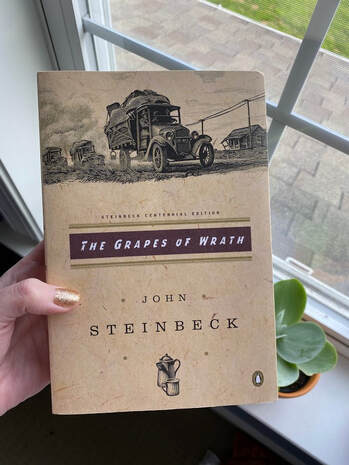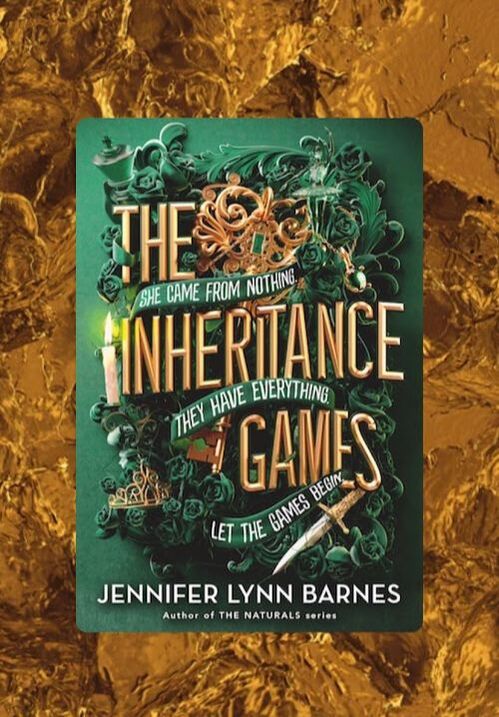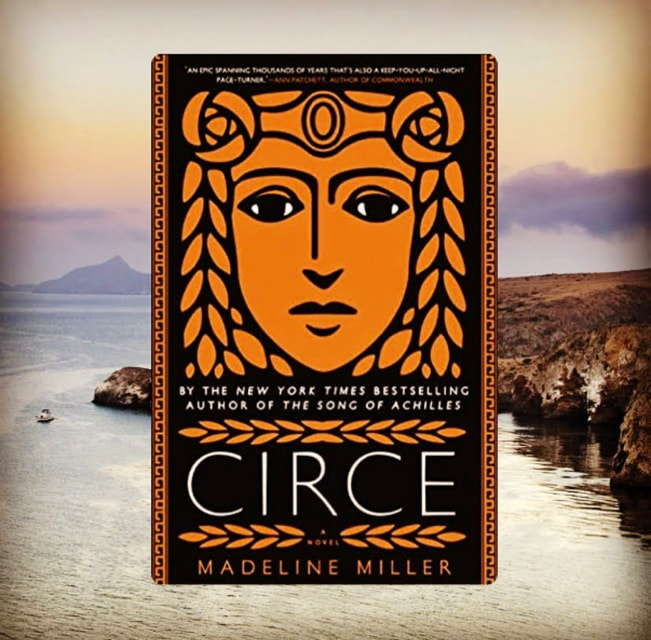|
This is my husband’s favorite book, and he’s been badgering me for years to read it. I always drag my heels when it comes to classics; there are just too many new books that I want to read instead. He wore me down, and I guess I’ll admit defeat. This is an epic novel that captures the prolonged sorrow and fury of migrant families during the Great Depression. The term epic gets thrown around a lot in the book review world, but if I had to give an example, this book would be in the top five. The profound themes reflect the history of the Great Depression but more importantly the humanity of people who find themselves destitute and still able to show kindness and compassion. The main character, Tom Joad, is fresh out of jail, looking to return to his family home. As he meets various people on his journey back, he learns that farm families have been evicted by banks, and people are leaving in droves for California, looking for work and shelter. Steinbeck’s writing is terrifyingly real as he depicts the mass migration with raw, descriptive power. Tom eventually finds his family, and as they too succumb to the draw of California, they encounter one trauma after another, rejected by their fellow Americans. The themes that persist despite their hardships are steadfast dedication to family and the power of pulling together in hard times. The “we take care of our own” vibe persists throughout the book. The final scene of Tom’s sister helping a dying man is a shocking climax to this universal idea of the human experience as one of compassion and altruism. The Grapes of Wrath is classic for a reason, and the rise of fire and dust is still relevant today.
0 Comments
This historical fiction novel explores the complexities and atrocities of antebellum New Orleans on a struggling sugar plantation, Le Petite Cottage. It’s disturbing and grand, horrifying, and eye-opening. It’s one thing to suggest that slavery is atrocious and it’s another to show how slavery stripped human beings of their dignity and self. The violence and sexual content are difficult to read but necessary at the same time. The realities of chattel slavery cannot be censored or glossed over. Rita Williams-Garcia weaves a cast of characters together revealing the many layers that exist between White plantation owners and the people they enslave. Matriarch Madame Sylvie Bernardin de Maret Dacier Guilbert dreams of her glory days in the French royal court. She was taken from France as a child and married off to a plantation owner. She’s arrogant, shrewd, entitled, and thrives on class and racial distinction. Her adult son, Lucien, is equally foul, and they enjoy battling each other for superiority. He tries desperately and pathetically to launch Le Petite Cottage out of debt when he’s not too busy preying on slave women. While Williams-Garcia exposes the Guilbert family’s truly depraved qualities, she also juxtaposes those against painful and tragic events that make them empathetically human. She paints them in dappled shades of darks and lights that are uniquely emotional for readers. Madame Sylvie is both fragile and jagged as her slave servant, Thisbe, wipes her, dresses her, and learns that Madame named her after Marie Antoinette’s dog. Williams-Garcia is a master at ushering the reader to both hate and feel pity for Madame Sylvie as the wretched creature’s big sweeping desire is to sit for a portrait so she can hang onto the last scrap of her legacy. Her grandson and heir to Le Petite Cottage, Byron, lives a double life as a West Point cadet, madly in love with his best friend, Pierce. Lucien does his best to force Pierce to “be a man.” Thisbe is a major character, and although she’s Madame’s personal house slave, isolated from her family day and night, she’s ostracized for having it easier when that’s anything but accurate. Williams-Garcia shows the complex layers of emotion that exist between slaves as they are pitted against one another for favor and survival; the unspoken rules on “how to act” when Whites are around serve as a uniting element. Thisbe “knows her place,” but she’s sharper than Madame Sylvie. She holds her ground, and when Madame Sylvie is at her weakest, Thisbe makes a bold move. A Sitting in St. James is epic, and the tangled emotional impact is jarring. A great book makes you feel, but an epic book makes you question your feelings. This one will sit with me for a long time.
The eighties movie, The Breakfast Club, has always been one of my favorites – a collection of high school student stereotypes all stuck in detention together, discovering that they share more in common than they ever realized. Karen McManus must have been a fan. She does the movie proud but with an added contemporary murder mystery twist, and I loved it. McManus sets this series opener off with a bunch of kids thrown together in detention who end up witnessing the death of another student. They’re all from different cliques but are bonded together as accusations are cast upon each student, and rumors swirl in the surrounding community. Sketchy history comes to light giving each student from detention the motive to commit the murder. Or was it suicide? Or was it something else entirely? McManus keeps readers guessing up until the very end. Her character arcs all happen outside the detention room which is a big diversion from The Breakfast Club movie in addition to the murder mystery element, but the inspired portions are quintessential nostalgia for adult readers. Relatable, unpredictable, angsty thriller fun for teens and adults! The third book is set to come out in 2023.
This is not the first of Ruta Sepetys’ books that I’ve read, and it certainly won’t be the last. She’s a master of storytelling and highlighting under-represented events and periods in history in a way that’s relatable for young people. Her latest is another young adult historical fiction that sheds light on the Nicolae Ceausescu dictatorship and communist rule of Romania in the late 1980s. Romanian citizens lived in terror due a vast and intricate spy network composed of ordinary citizens set up to spy on one another for government favors including food, medicine, and electricity. Families and neighbors, teachers and students, coworkers and friends are all starving, paranoid, and constantly looking over their shoulders worried about who will turn them in for voicing even the slightest bit of discontent over Ceausecscu’s rule by isolation, deprivation, and fear. Homes are bugged. Food rations are extreme. Everything is illegal from Coke and Twinkies to western magazines and typewriters. People trade in Kents (cigarettes). This is the world that teenager, Cristian Florescu, is being raised in. He dreams of being a writer, keeps a secret notebook, and instead of dreaming about his future, he watches his grandfather slowly dying and his parents suffering in silence. Cristian finds himself at the mercy of the secret police, Securitate, as they force him to become an informer, using him to spy and report back for medicine for her grandfather. His efforts at subversion reach a tipping point when the Romanian revolution takes hold, and Cristian can no longer be part of the silence. His rage and frustration are loud, and he takes brave risks to become part of the solution to expose the country’s suffering to the world. Sepetys sears this story into your heart. Cristian’s longing, fear, and passion jump off the page and make him come alive. The country’s suffering is heartbreaking. This is a fascinating, somber, and hopeful historical piece that you can only come away from in awe.
A billionaire’s mansion. A cryptic will. Four alluring grandsons. A family inheritance denied. Secret passages. Is it all just a game left by a twisted, rich old man or is there something deeper to the mystery of why Avery Grambs was left a fortune from a man she’s never even met or heard of? Jennifer Lynn Barnes knows how to keep a reader glued to the pages. This is a breezy, fun delight. Barnes jumpstarts this young adult mystery trilogy with puzzles and twists right from the first few pages. Avery just wants to get out of high school and move on with her life. Billionaire Tobias Hawthorne dies and bequeaths his estate and entire fortune to her. To claim her inheritance, she must move into the sprawling Hawthorne House and stay there for a year. The house is filled with intrigue including the entire disinherited Hawthorne family, and most of them are not too thrilled with the interloper. Who is Avery and why did Tobias leave her everything, cutting the family out entirely? Together with the four handsome Hawthorne grandsons, Avery sets out to discover the truth about the mansion and the old man’s penchant for riddle and games. There’s a lot of lusty tension brewing in between a love triangle of sorts which just adds to the suspense of turning each page. I’m a huge puzzle nerd, so I love the juxtaposition of romance with a clue-based contemporary mystery. Inheritance Games is just plain fun.
I expected to fly through this and then gush over it with my other book friends but instead, I slogged through for weeks and found myself avoiding it entirely. It starts with an engrossing love story between Ifemelu and Obinze as young Nigerians. Ifemelu heads to America with the plan for Obinze to join her, and things don’t happen as they intend. Ifemelu is faced with what it’s like to be Black in America and begins writing a blog. Her reflections on race, culture, identity, and immigration are thought-provoking and eye-opening. She writes about what it’s like to be Black in Nigeria versus in America. When Adichie leads with her characters, the book is amazing. When she strays and takes on commentary, it gets choppy, long, and burdensome. Her heavy introspection forces the plot away from the characters and loses the beautiful story-telling that captured my interest early in the book. I longed for Ifemelu and Obinze to tell more of their story but by the end, the momentum crashed and burned. It ended up feeling like a set of disconnected short stories with a thin thread of commonality that never created anything whole.
This duology is a Romeo and Juliet retelling set in Shanghai in the 1920s. Two major gangs run the city and are constantly embroiled in a longstanding blood feud. Juliette Cai, recently returned from America, is the heir to the Scarlet Gang while her childhood friend and once-flame, Roma Montagov, is heir to the Russian White Flowers gang. A sickness creeps into Shanghai, one that causes people to claw their own throats out, and as gang members on both sides fall to this new rival, both Juliet and Roma struggle to find answers. Is it contagion or a monster lurking beneath the darkness of the Huangpu River? Roma and Juliette have to put aside their differences and work together to save their city. The sexual tension between these two is fire. They feign hatred for one other with intensity but then can’t tear away from each other’s eyes; a single brush of a fingertip sends them reeling back to a time when they cared for each other deeply, and family feuds didn’t matter. The push-pull of attraction is satiating. I love how Chloe Gong immerses this story of love and yearning amidst themes of colonization, identity, and culture. Juliette is Chinese and returns only to find that she feels like an outsider in her own home country as foreigners have taken over the city. Roma is torn between loyalty to his family and the violent path they’ve carved out versus loyalty for people he loves regardless of gang ties. The setting is lush with bright lights and seedy, dark alleys, filth and fringe, holstered guns and flapper dresses, gritty streets and golden decadence, and you can’t help but feel part of the city. I didn’t love the ending; it was a hodge-podge of too many things, and it felt a little rushed but still a gorgeous young adult blend of sweeping classic elements and intricate modern drama.
I want to snuggle this book; it’s so warm and fuzzy. This is definitely going on my favorites pile for many reasons. I finished it and couldn’t stop smiling. Linus Baker is a rule follower, and he lives an ordinary, lonely life with a cat. He’s employed as a children’s case worker for the Department in Charge of Magical Youth, and he takes his job very seriously. Linus is charged with inspecting orphanages and making sure the children are “safe” and well-cared for. Due to his extreme sense of duty and strict adherence to rules, Linus is sent on a special, highly classified assignment to Marsyas Island where he meets a peculiar group of magical children that test his limits, his patience, and everything in between. Each child has a fascinating magical ability that humans fear, and Linus begins to wonder if the government wants the children protected or hidden. Mysterious and magnetic, Arthur Parnassus is the caretaker, and in his steadfast dedication to the children of Marsyas, he also helps usher Linus into a new understanding of what it really means to protect them when rule-following doesn’t always shape up to be fair. The message in this book is so universally comforting and seamlessly blended that although it’s set in a fantasy world, it feels like it’s real and completely applicable now. The humor is injected into this book in just the right places, and I chuckled, giggled, and laughed out loud all the way through. I don’t think I could dare pick a favorite child of Marsyas, but Lucy is especially darling as the Antichrist. Don’t be fooled by this sweet review; this book is not a breezy beach read. It’s brimming with tough conversations about hate, prejudice, and the bystander effect. In our world where differences are feared and hatred abounds, T.J. Klune finds a way to leave readers with a little hope. Look for the light in folks and focus on that shimmer; there are joyful parts to our differences, and you can’t help but grin when you see them shining on these pages.
A powerful woman, characterized as a witch to demean and vilify her success, is a tale as old as time; one that all women can relate to in some form or another. Madeline Miller takes Circe out of The Odyssey and tells how her story is more than just a woman who turns men into pigs. I’ve never really been into mythology and so I was surprised at how quickly I became entranced by Circe’s story. It’s incredibly sad and empowering all at once but showcases her as a feminine force in a world made for men and gods. Circe is the lesser nymph daughter of the mighty Titan, Helios, and she’s outcast immediately as a weak, insignificant nuisance until she discovers the powers of witchcraft, specifically transformation. She’s banished to an island to live out her days as an exile. Circe lives a lonely existence until she chooses to take her power back. She hones her skills, tames the wild beasts roaming free, and makes the island not only her home, but her strength. She’s flawed in many ways, but Miller doesn’t shy away from showing Circe’s weaknesses as this is exactly what makes her such a relatable and compelling character. A host of familiar mythological figures cross paths with Circe including Icarus, Daedalus, the Minotaur, Hermes, and Odysseus, but it’s clear that they’re only fleeting elements of HER story. I ached for Circe; her pain and loss, so raw throughout her lifetime, is a constant that she faces and accepts but never succumbs. She suffers as a daughter, lover, and mother but ultimately uses her scorn as fuel for triumph, and I rooted for her on every, single page.
This Tender Land is everything I want in a book – heart, depth, humor, sweeping historical elements, mystery, adventure, and an ending that leaves me feeling right with the world. This was my top read for 2021. Originally, I bought it for my husband who gobbled it up in mere days and then raved about it so intensely that I read it just so he’d stop pestering me. He just wanted me to fall in love with it the same way he did. I quickly fell under the book’s spell, so now he’s happy. It’s a Huck Finn and Wizard of Oz-style mash-up adventure set in 1923 during the Great Depression. Odie, Albert, Mose, and Emmy set out on an epic journey after leaving the Lincoln Indian Training School in Minnesota where Native American children were forcibly separated from their families and stripped entirely of their heritage, language, and identity. Odie and Albert O’Banion, both white, were sent to live as orphans at the Lincoln because it was the only place in the area that had room. Odie constantly gets into trouble with Mrs. Brinkman who runs the school and doles out cruel punishments with intense enjoyment. The O’Banion brothers’ best friend, Mose, is a mute Sioux who speaks by sign language. The boys all have a special place in their hearts for little Emmy, daughter of one of their kind teachers. Tragedy strikes in the form of a tornado and a crime that implicates them all, changing the course of their lives forever. They set out in a canoe on the Gilead River, hiding from their secrets and searching for themselves and a place to call home. They meet a caravan of characters, from sinister to divine, where they learn about what friendship, identity, forgiveness, and family really mean. I imagine this book will be studied as a classic someday. The metaphor of the river propelling them on this life journey is mythic and powerful. This is the kind of book where writing is showcased as a craft - finely tuned, layered, and with thoughtful attention to every word and phrase. I felt like these kids were my pals, dragging me along on their river odyssey. I cling to their stories; I ache for their despair and cry fat, happy tears for the brief moments of joy and belonging that juxtapose the gloom of the Depression era setting. William Kent Krueger ingeniously writes this legendary story in a way that feels both nostalgic and contemporary at the same time. This Tender Land has the darkness of Stand By Me [The Body], the wistfulness of the Grapes of Wrath, and the heart of The Princess Bride.
|
AuthorTravel All the Pages is inspired by my two loves - travel and reading, a combo I can't resist. Enjoy these little pairings. Archives
March 2023
Categories
All
|










